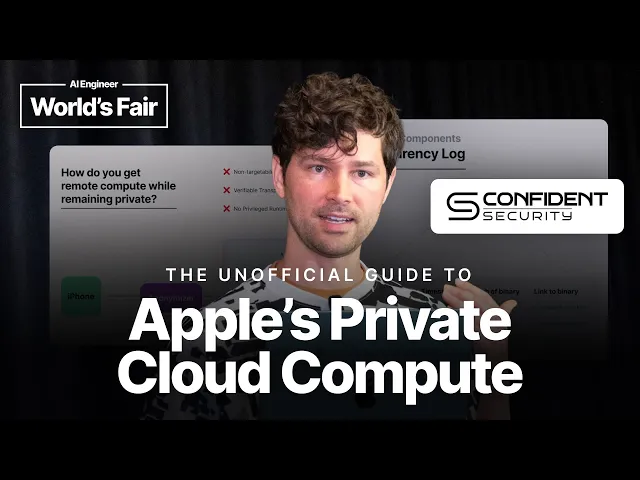The Unofficial Guide to Apple’s Private Cloud Compute

Apple's privacy play transforms AI landscape
In the rapidly evolving world of AI, Apple is taking a fundamentally different approach to how it processes user data. Jonathan Mortensen's recent talk at CONFSEC pulls back the curtain on Apple's Private Cloud Compute (PCC), revealing a framework designed to run machine learning models while protecting user privacy. This architectural choice not only differentiates Apple from competitors but potentially reshapes how we think about balancing AI capabilities with privacy protection.
Key Points
-
Apple's Private Cloud Compute runs complex AI models without retaining or accessing user data, unlike traditional cloud-based machine learning platforms that centralize and store personal information.
-
PCC employs a serverless architecture designed specifically to prevent data persistence, with ephemeral systems that load models on demand and discard all user data after processing.
-
The system incorporates multiple technical safeguards including encrypted communication channels, attestation mechanisms to verify infrastructure integrity, and strict isolation of user data throughout processing.
The Privacy Paradigm Shift
The most insightful aspect of Apple's approach is how it fundamentally inverts the traditional cloud computing model. While most tech giants build AI systems that aggregate user data to improve services, Apple has created an architecture that explicitly prevents data collection while still delivering advanced AI capabilities.
This matters enormously in today's digital landscape. As AI capabilities grow more sophisticated, so do privacy concerns. Regulators worldwide are implementing stricter data protection measures like GDPR and CCPA, while consumers grow increasingly wary of how their personal information is used. Apple's approach represents a viable technical solution that doesn't force the traditional tradeoff between functionality and privacy.
In essence, Apple is betting that privacy-preserving AI will become a competitive advantage rather than a limitation. By implementing PCC, Apple signals to both consumers and the industry that powerful AI doesn't necessarily require invasive data collection practices.
Beyond The Discussion
What Mortensen's talk doesn't fully address is the performance and economic implications of Apple's approach. Traditional cloud AI services benefit from economies of scale and continuous model improvement through data aggregation. By comparison, Apple's architecture likely incurs higher operating costs by spinning up and down ephemeral environments and potentially sacrifices some performance optimization opportunities.
Google's recent Gemini model launch demonstrates the alternative approach—massive data collection enabling increasingly capable models
Recent Videos
How To Earn MONEY With Images (No Bullsh*t)
Smart earnings from your image collection In today's digital economy, passive income streams have become increasingly accessible to creators with various skill sets. A recent YouTube video cuts through the hype to explore legitimate ways photographers, designers, and even casual smartphone users can monetize their image collections. The strategies outlined don't rely on unrealistic promises or complicated schemes—instead, they focus on established marketplaces with proven revenue potential for image creators. Key Points Stock photography platforms like Shutterstock, Adobe Stock, and Getty Images remain viable income sources when you understand their specific requirements and optimize your submissions accordingly. Specialized marketplaces focusing...
Oct 3, 2025New SHAPE SHIFTING AI Robot Is Freaking People Out
Liquid robots will change everything In the quiet labs of Carnegie Mellon University, scientists have created something that feels plucked from science fiction—a magnetic slime robot that can transform between liquid and solid states, slipping through tight spaces before reassembling on the other side. This technology, showcased in a recent YouTube video, represents a significant leap beyond traditional robotics into a realm where machines mimic not just animal movements, but their fundamental physical properties. While the internet might be buzzing with dystopian concerns about "shape-shifting terminators," the reality offers far more promising applications that could revolutionize medicine, rescue operations, and...
Oct 3, 2025How To Do Homeless AI Tiktok Trend (Tiktok Homeless AI Tutorial)
AI homeless trend raises ethical concerns In an era where social media trends evolve faster than we can comprehend them, TikTok's "homeless AI" trend has sparked both creative engagement and serious ethical questions. The trend, which involves using AI to transform ordinary photos into images depicting homelessness, has rapidly gained traction across the platform, with creators eagerly jumping on board to showcase their digital transformations. While the technical process is relatively straightforward, the implications of digitally "becoming homeless" for entertainment deserve careful consideration. The video tutorial provides a step-by-step guide on creating these AI-generated images, explaining how users can transform...
